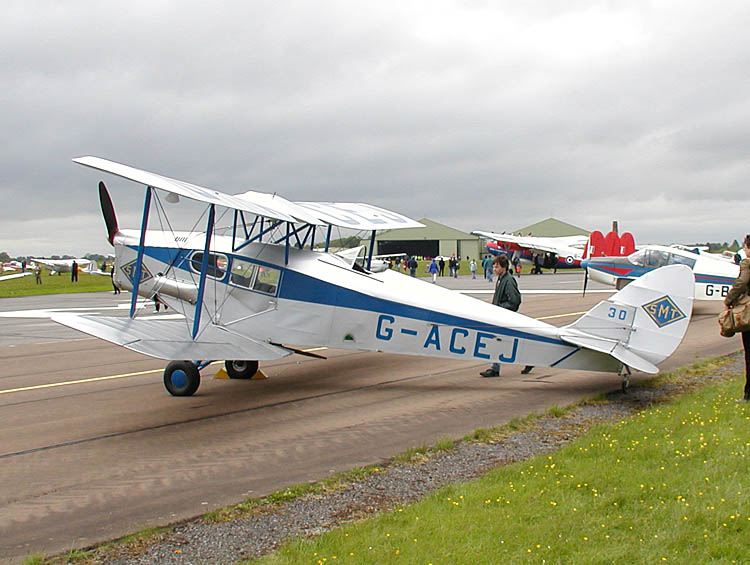- De Havilland Fox Moth
Infobox Aircraft
name = DH.83 Fox Moth
type = Passenger aircraft
manufacturer =de Havilland 
caption =
designer = A.E. Hagg
first flight = March 1932
introduced = 1932
retired =
status =
primary user =
more users =
produced =
number built = 154
unit cost =
variants with their own articles =The DH.83 Fox Moth was a successful small biplane passenger aircraft from the 1930s powered by a single de Havilland Gipsy inline inverted engine, manufactured by the
de Havilland Aircraft Company.The aircraft was designed late in 1931 as a very cheap and economical light passenger aircraft. Many components including the engine, undercarriage and wings were identical to those being used for the
de Havilland Tiger Moth then being built in large quantities as a military trainer, which were fitted to the purpose-built wooden, plywood covered fuselage. The pilot sat in a raised cockpit behind the small enclosed passenger cabin, which was usually fitted with four seats for short range hops or three for longer range uses.The prototype was sent to Canada and gained sufficient interest that two more were built at the company's Toronto plant - it reintroduced series manufacture there in 1946. "Home" production was mostly used on short-haul flights around the British Isles. An exception was the Fox Moth VH-UQM "Miss Currie" that was purchased by
Victor Holyman for £1,450 and began operating over the 108-mile route over south-easternBass Strait betweenLaunceston, Tasmania and Whitemark onFlinders Island in October 1932. It was thus the inaugural aircraft of what was to later becomeAustralian National Airways .Total production of the DH.83 Fox Moth was 154, being 98 in England, 2 in Australia and 54 in Canada. A number of different engines were used, including the 130 hp Gipsy IIIA (later Gipsy Major) on most British-built aircraft and the 145 h.p. Gipsy Major 1C on the 52 post-war Canadian-built aircraft.
Variants
* DH.83 Fox Moth : Light transport biplane. 98 built in the United Kingdom, plus two more in each of Australia and Canada.
* DH.83C Fox Moth : 52 aircraft were built in Canada after World War II.
* Chidorigo : The Chidorigo was a Japanese-built copy powered by a 150 hp radial engine. Only one aircraft, J-BBJI, was built, by the Japan Aerial Transport Company, who also owned four British-built Fox Moths.Operators
;flag|Canada|1921
*Royal Canadian Air Force ;NZL
*Royal New Zealand Air Force
**No. 42 Squadron RNZAF ;flagicon|Spain|1939Spanish State
*Spanish Air Force ;flag|Yugoslavia|kingdom:
*Aeroput pecifications (DH.83)
aircraft specifications
plane or copter?=plane
jet or prop?=prop
ref=
crew=1
capacity=3-4 passengers
payload main=
payload alt=
length main= 25 ft 9 in
length alt= 7.8 m
span main= 30 ft 10 in
span alt= 9.4 m
height main= 8 ft 9 in
height alt= 2.7 m
area main= 261 ft²
area alt= 24.3 m²
airfoil=empty weight main= 1,100 lb
empty weight alt= 500 kg
loaded weight main= 2,070 lb
loaded weight alt= 940 kg
useful load main=
useful load alt=
max takeoff weight main=
max takeoff weight alt=
more general=
engine (prop)=de Havilland Gipsy III
type of prop=
number of props=1
power main= 120 hp
power alt= 97 kW
power original=max speed main=113 mph
max speed alt= 173 km/h
cruise speed main=
cruise speed alt=
stall speed main=
stall speed alt=
never exceed speed main=
never exceed speed alt=
range main= 360 miles
range alt= 550 km
ceiling main= 12,700 ft
ceiling alt= 3,850 m
climb rate main= 492 ft/min
climb rate alt= 150 m/min
loading main=
loading alt=
thrust/weight=
power/mass main=
power/mass alt=
more performance=
armament=
avionics=References
External links
* [http://www.dhmothclub.co.uk/ The de Havilland Moth Club]
Wikimedia Foundation. 2010.
